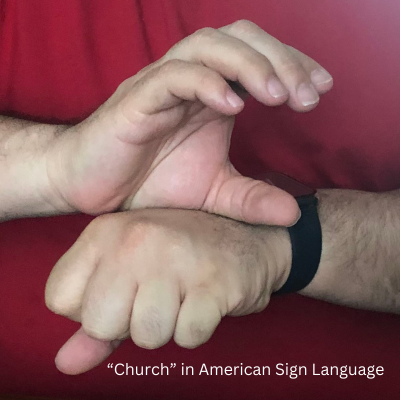How churches can celebrate Deaf Awareness Week
 As International Deaf Awareness Week approaches on Sept. 25, hearing and Deaf congregations alike can celebrate Deaf culture for that week — and well into the future.
As International Deaf Awareness Week approaches on Sept. 25, hearing and Deaf congregations alike can celebrate Deaf culture for that week — and well into the future.
For hearing congregations, it is important to note that it is not a week to minister to the Deaf community. Rather, it is a time where hearing congregations can minister with the Deaf community. That rethinking, the Rev. Leo Yates said, changes the “power differential” that sometimes occur when hearing congregations treat Deaf individuals as in need of ministering, instead of equals in ministry.
“It's one thing to provide an interpreter, but it's a different story in order to have a relationship,” said Yates, the conference’s accessibility and inclusivity coordinator. Yates, although hearing, was born to Deaf parents and raised in a Deaf church.
“That's why people come back to church, why they get involved in ministries and programs, where they make church friends, where they can find a sense of purpose in serving,” he added.
The World Federation of the Deaf began Deaf Awareness Week in Rome, Italy in 1958. The federation made the last week of September the week to celebrate Deaf culture.
The National Institute of Health estimates that 10 million people are Hard-of-Hearing, while one million individuals are Deaf.
According to Silent Blessings Deaf Ministries, less than five percent of churches in the United States have Deaf ministries — and even fewer have ministries that are age appropriate. The Deaf community is the largest unreached people group in North America, with only two to four percent of Deaf individuals identifying as Christian.
Those statistics, in part, stem from what Yates and the Rev. Kirk Van Gilder refer to “audism” — discrimination and exclusion of Deaf and hard-of-hearing people — within the church.
Van Gilder, a professor of religion at Gallaudet University, recalled times when people in hearing congregations would complain that having an interpreter was too expensive, or providing access was too complicated. Some people, he said, even said they’d pray for him to become hearing — or that his sin had kept him from being “healed.”
“They are traumatizing experiences and make going to a hearing church, and even a Deaf church, a difficult time given that one has to confront and work through such traumas, often while being re-traumatized,” Van Gilder said.
But those statistics do not encompass the full spectrum of spirituality and values within the community.
In some cases, Deaf individuals may not be “drawn to the institutional trappings of Church membership” after negative experiences with audism. But values of faith and love persist.
“Spirituality and Christian love are still present in our communities even if they don’t find expression in the ways that ‘churched’ Christians expect,” Van Gilder said. “Such expressions of belief and faith may not fit the measures the institutional church would like to see, but they are signs of God’s growth and presence in the lives of people and should not be regarded as lesser than ‘being churched’ in the sense of attending services or membership.”
Among more than 600 congregations, the Baltimore-Washington Conference has two churches that serve the Deaf community. Christ Deaf United Methodist Church in Baltimore and Magothy United Methodist Church of the Deaf in Pasadena both serve the Deaf community in the conference.
The United Methodist Committee on Deaf and Hard-of-Hearing Ministries offers a number of ways to celebrate the community during the week — and beyond.
During that Sunday’s worship service, hearing congregations can increase accessibility by having a captionist, including the American Sign Language alphabet in the bulletin and sharing Deaf etiquette for hearing congregations. The committee also suggests teaching a worship song in sign language, and having a Deaf individual read Scripture or lead worship with an interpreter for hearing congregations.
Beyond that week’s Sunday worship, churches can participate in advocacy for the Deaf community and educate hearing members. Show a video on the history of ASL or teach ASL to congregations. Placing brochures about Deaf awareness can also serve as a way to educate.
For those in the conference wanting to learn more, the BWC and the UMC’s Deaf and Hard of Hearing Ministries Committee will offer a Church Interpreting Academy on Sept. 23 from 9:30 a.m. to noon on Zoom. The three tracks to choose from include Introduction to Sign Language, Introduction to Church Interpreting, and Learning Religious Signs and Phrases. The webinar is free. Learn more and register.
Perhaps most importantly, pastors and leaders can teach on the radical inclusivity of Scripture — and how that applies to the Deaf community. Mark 7:31-37 calls the Church to be open and inclusive to the Deaf community, while 1 Corinthians:1-11 describes the spiritual gifts that Deaf and hard-of-hearing individuals bring to the body of Christ. Yates also refers to Luke 1:57-66, where accommodations were made for Zechariah, who appears to be Deaf and mute.
For a full list of ways congregations can celebrate International Deaf Awareness Week, see the United Methodist Committee on Deaf and Hard-of-Hearing Ministries suggestions here.
Overall, however, making efforts to better understand Deaf culture, language and experiences will help hearing congregations better celebrate and include Deaf and hard-of-hearing individuals.
“Learn more,” Van Gilder said. “Listen more. Prepare the way for the Deaf people you’ve never met, and may never meet in your congregation by understanding our worlds, our experiences, our cultures, and our languages.”
